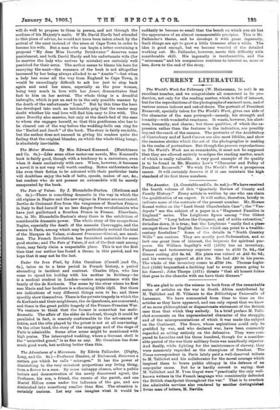Under the Iron Flail, by John Oxenham (Cassell Co.,
6s.), takes us to a later period in French history, a period abounding in incident and contrast. Charles Glyn, who has come to spend his holiday with his mother in Brittany—he is a medical student in London—makes acquaintance with the family of the de Kerhuels. The scene by the river where he first sees Marie and her brothers is a charming little idyll. But there are indications of very different things soon to be ; and these speedily show themselves. There is the private tragedy in which the de Kerhuels and their neighbours, the de Querhoals, are concerned ; and there is the great public tragedy of the Franco-Prussian War. We venture to think that the former is somewhat too melo- dramatic. The affair of the elder de Kerhuel, though it could be paralleled in fact, is scarcely conformable to the art-canons of fiction, and the role played by the priest is not at all convincing. On the other hand, the story of the campaign and of the siege of Paris is admirable. Scene after scene might be mentioned with high praise. The interrupted wedding, where a German shell is the " uninvited guest," is as fine as any. Mr. Oxenham has done much good work, but nothing better than this.






































 Previous page
Previous page